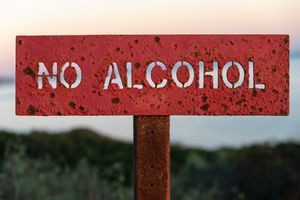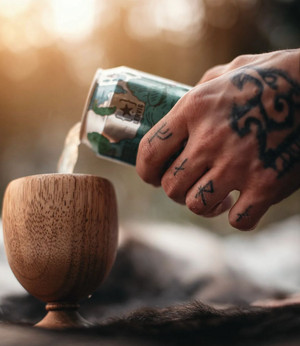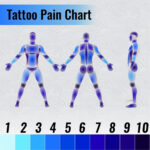Can you drink alcohol and get a tattoo? No, consuming alcohol before or after getting inked is generally discouraged by tattoo artists and medical professionals due to various potential risks. At tattooat.com, we believe in informed decisions; therefore, we provide insights into the effects of alcohol on the tattooing process, ensuring your body art experience is both safe and satisfying, helping you make the best choices for your body art journey. Understanding the interaction between alcohol, tattoo aftercare, and potential health risks allows you to protect your body investment and get the best tattoo result, exploring artistic expression.
1. Understanding the Risks: Why Alcohol and Tattoos Don’t Mix
Alcohol can significantly interfere with the tattooing process and the subsequent healing period. Here’s why abstaining from alcohol is essential:
1.1. How Does Alcohol Affect the Tattooing Process?
Alcohol consumption affects your body negatively during and after a tattoo session, here is how it impacts the process:
| Risk Factor | Description |
|---|---|
| Blood Thinning | Alcohol thins the blood, potentially leading to excessive bleeding during the tattoo session. |
| Impaired Healing | Reduced blood clotting can slow down the healing process, making the tattoo more susceptible to infection. |
| Compromised Judgment | Alcohol impairs decision-making, possibly leading to regret about the tattoo design or placement. |
| Behavioral Issues | Intoxication can cause restlessness or aggression, making it difficult for the tattoo artist to work and potentially affecting the quality of the tattoo. |
| Legal Concerns | Tattoo artists may refuse to tattoo someone under the influence due to legal and ethical considerations related to consent. |
| Immune Suppression | Alcohol weakens the immune system, increasing the risk of infection after the tattoo is done. |
| Poor Tattoo Quality | Excessive bleeding and impaired judgment can result in a poorly executed tattoo that does not meet expectations. |
| Delayed Recovery | Alcohol delays the body’s natural healing mechanisms, prolonging the recovery period and increasing the risk of complications. |
| Increased Pain | While alcohol might initially seem to dull pain, it can increase sensitivity in the long run, making the tattooing process more uncomfortable. |
| Poor Aftercare | Intoxication can lead to neglect of aftercare instructions, increasing the risk of infection and affecting the tattoo’s appearance over time. |
 No Alcohol Sign for Tattoos
No Alcohol Sign for Tattoos
1.2. The Science Behind Alcohol’s Impact
According to a study from the University of Portland’s Department of Health Sciences, published in July 2023, alcohol inhibits your immune system by reducing the number of antibodies available to your body. When you get a tattoo, your body perceives it as an injury and immediately begins the healing process. Alcohol also expands your blood vessels, thinning your blood and causing increased bleeding. The body naturally clots to help heal any wound, but alcohol inhibits this process and can cause poor healing of your new tattoo.
2. Before the Needle: Abstaining from Alcohol Before Your Tattoo
It’s not just about avoiding alcohol after getting your tattoo. Abstaining before the session is equally important.
2.1. Why Avoid Alcohol Before Getting a Tattoo?
It is recommended that you avoid alcohol for 24 hours before your tattoo session to help reduce any bleeding or healing complications.
| Reason | Explanation |
|---|---|
| Thinner Blood | Alcohol thins the blood, leading to excessive bleeding during the tattooing process, making it difficult for the tattoo artist to see clearly and apply the ink correctly. |
| Impaired Judgment | Alcohol impairs decision-making, which can lead to choosing a design or placement you may later regret. |
| Increased Sensitivity | Alcohol can increase your sensitivity to pain, making the tattooing session more uncomfortable. |
| Poor Communication | Alcohol affects your ability to communicate clearly with your tattoo artist, potentially leading to misunderstandings about the design or placement. |
| Cancellation of Appointment | Tattoo artists may refuse to tattoo you if they suspect you are under the influence of alcohol, leading to the loss of your deposit. |
| Risk of Infection | Alcohol weakens your immune system, increasing the risk of infection after the tattoo is done. |
| Longer Healing Time | Increased bleeding due to alcohol consumption can prolong the healing process, increasing the risk of complications. |
| Compromised Tattoo Quality | Excessive bleeding can result in a poorly executed tattoo that does not meet your expectations or the artist’s standards. |
| Unethical Behavior | Getting tattooed while drunk is considered unethical as it impairs your ability to provide informed consent. |
| Negative Impact on Shop | Your behavior while intoxicated can make other customers uncomfortable and harm the reputation of the tattoo shop. |
 People Talking At a Restaurant Drinking Wine before Tattoo
People Talking At a Restaurant Drinking Wine before Tattoo
2.2. The Risks of Drinking Beforehand
There are many risks of drinking alcohol before your tattoo appointment, including:
2.2.1. Blood Thinning and Tattoo Quality
Alcohol consumption leads to blood thinning, causing more blood flow during the tattooing process. This can dilute the ink, affecting the tattoo’s longevity and clarity.
2.2.2. Impaired Judgment and Decision-Making
Sobriety ensures clear decision-making regarding the tattoo’s placement, style, size, and design. It prevents choices that might be regretted later.
2.2.3. Emotional Instability
Alcohol can cause emotional instability, making it difficult to work with the tattoo artist. Reputable shops avoid tattooing individuals under the influence due to potential disruptions.
2.2.4. Session Cancellation
If a tattoo artist suspects alcohol consumption, they may cancel the session to ensure the client’s safety and adherence to legal regulations. Intoxicated individuals cannot legally provide consent.
2.2.5. Negative Impact on the Tattoo Shop
Behavior resulting from alcohol consumption can make other customers uncomfortable and compromise the tattoo’s quality, harming the artist and the studio’s reputation.
3. After the Ink: Navigating Aftercare and Alcohol Consumption
Once you’ve got your new tattoo, the aftercare process begins, and alcohol still doesn’t fit into the picture.
3.1. When Can You Drink Alcohol After Getting a Tattoo?
Wait at least 48 hours after getting your new tattoo before consuming alcohol. According to tattooat.com’s professional artists, the bare minimum is 48 hours, but longer is always better! Alcohol impairs your immune system, so you need to avoid alcohol until your new tattoo has begun to heal, meaning your open wound has started to scab.
3.2. Risks of Drinking Too Soon
Drinking alcohol too soon after getting your new ink can impact the body negatively and affect the look of the tattoo:
| Risk | Description |
|---|---|
| Prolonged Bleeding | Alcohol’s blood-thinning effect can cause continued bleeding, hindering the clotting and scabbing process necessary for healing. |
| Increased Infection Risk | Alcohol weakens the immune system, making the tattoo site more vulnerable to bacterial or viral infections, which can lead to serious complications. |
| Delayed Healing | The body’s natural healing mechanisms are suppressed by alcohol, which can slow down tissue repair and prolong the overall healing period, increasing the risk of scarring. |
| Poor Ink Retention | Excessive bleeding due to alcohol consumption can cause the ink to leach out of the skin, resulting in a faded or patchy tattoo that requires touch-ups. |
| Impaired Judgment | Alcohol impairs decision-making, potentially leading to poor aftercare habits such as inadequate cleaning, excessive touching, or picking at scabs, which can damage the tattoo. |
| Scarring | Disrupted healing and increased inflammation caused by alcohol can elevate the risk of developing permanent scars, altering the tattoo’s appearance. |
| Systemic Effects | Alcohol affects the entire body, further stressing the immune system and interfering with the natural recovery process, thus compromising the tattoo’s quality and longevity. |
| Discoloration | Alcohol-induced inflammation and compromised healing can lead to discoloration of the tattoo, altering the intended colors and making the design look less vibrant. |
| Poor Skin Quality | The skin around the tattoo may become dry and irritated due to alcohol consumption, which can affect its elasticity and overall health, potentially damaging the tattoo’s appearance. |
| Overall Health Impact | Alcohol has a negative impact on overall health, which can indirectly affect the healing of the tattoo and increase the risk of complications. |
 Tattooed Hand Pouring a Beer in a Wooden Cup
Tattooed Hand Pouring a Beer in a Wooden Cup
4. Sober Canvas: Why Tattoo Artists Refuse to Ink Drunk Clients
It is not legal for tattoo artists to tattoo clients who are drunk, and for good reason.
4.1. Legal and Ethical Considerations
Tattoo artists have a professional and legal responsibility to ensure clients are in a state of mind to provide informed consent. Intoxication impairs judgment and the ability to understand the risks and implications of getting a tattoo.
4.2. Maintaining a Safe Environment
Tattoo shops prioritize creating a safe and comfortable environment for all clients and staff. Intoxicated individuals can disrupt this environment with unpredictable behavior.
4.3. Quality of Work
Tattooing requires precision and focus. Tattooing an intoxicated person can compromise the quality of the tattoo because they can move more or experience greater sensitivity.
5. The Hangover Effect: Long-Term Impact on Your Tattoo
The effects of alcohol can extend beyond the initial healing period, potentially impacting the longevity and appearance of your tattoo.
5.1. Compromised Immune System
Even after the initial 48-hour period, excessive alcohol consumption can weaken your immune system. This can make your tattoo more susceptible to infections and complications down the line.
5.2. Skin Health and Appearance
Long-term alcohol abuse can damage your skin, making it dry, less elastic, and more prone to premature aging. This can affect the appearance of your tattoo over time, causing it to fade or distort.
6. Alternatives to Alcohol: Preparing for Your Tattoo Session
If you’re looking for ways to relax and prepare for your tattoo session without alcohol, here are some healthier alternatives:
6.1. Natural Remedies
6.1.1. Herbal Teas: Chamomile and lavender teas have calming properties that can help reduce anxiety.
6.1.2. Aromatherapy: Essential oils like lavender and eucalyptus can promote relaxation and reduce stress.
6.1.3. Meditation: Practicing mindfulness and meditation can help calm your nerves and center your mind before your appointment.
6.2. Dietary Choices
6.2.1. Hydration: Drink plenty of water in the days leading up to your appointment to keep your skin hydrated and healthy.
6.2.2. Nutritious Foods: Eat a balanced diet rich in vitamins and minerals to support your immune system and promote healing.
| Food | Description |
|---|---|
| Oranges | Contains Vitamin C, which is vital for collagen production and good for the connective tissue in your skin. |
| Chocolate | Dark chocolate provides goodness from the inside out, which helps speed up the renewal process of your skin cells, and the end result is faster healing. |
| Broccoli | Contains a huge concentration of antioxidants, such as Vitamins C and K, which are protective for your skin in terms of softness and strength. |
| Blueberries | Packed with antioxidants, they provide benefits for your immune system and healing in general, and act as a kind of intestinal broom. |
| Pineapple | High Vitamin C content makes your skin look young and hydrated, and it has collagen in it which builds up the skin’s strength and elasticity. |
| Garlic | Benefits almost all parts of the body, is strongly associated with natural healing, stimulates the immune system to aid healing and prevent infection. |
| Water | Hydrates and nourishes the skin and can counter problems you might have with excessive bleeding. |
| Tomatoes | Great source of Vitamin C and Vitamin A, which preserves the skin from future damage, and is thought to have some protective properties against sun damage. |
 Oranges and Dark Chocolates Good For Skin
Oranges and Dark Chocolates Good For Skin
6.3. Preparing for Comfort
6.3.1. Rest: Get a good night’s sleep before your tattoo session to ensure you’re relaxed and well-rested.
6.3.2. Comfort Items: Bring a comfort item, such as a stress ball or a favorite blanket, to help you relax during the tattooing process.
7. Addressing Myths and Misconceptions
There are several common misconceptions about alcohol and tattoos that need to be addressed.
7.1. Myth: Alcohol Dulls the Pain
While alcohol may initially seem to dull pain, it can actually increase sensitivity in the long run. It also impairs judgment and can lead to risky behavior.
7.2. Myth: A Little Alcohol Won’t Hurt
Even small amounts of alcohol can have a negative impact on the tattooing process and healing. It’s best to abstain completely to ensure the best possible outcome.
8. Professional Advice and Guidelines
Seeking advice from tattoo artists and healthcare professionals is crucial for making informed decisions about alcohol consumption and tattoos.
8.1. Consulting with Tattoo Artists
Tattoo artists can provide valuable insights based on their experience and knowledge of the tattooing process. They can offer personalized recommendations and guidelines based on your individual needs and circumstances.
8.2. Seeking Medical Advice
Healthcare professionals, such as doctors or nurses, can provide medical advice and guidance on alcohol consumption and its impact on your health. They can assess your overall health and recommend strategies for promoting healing and preventing complications.
9. What to Do If You Accidentally Drank Before or After
Sometimes, despite your best efforts, you may accidentally consume alcohol before or after getting a tattoo. Here’s what to do:
9.1. Communication Is Key
Be honest with your tattoo artist and healthcare provider about your alcohol consumption. They can assess the situation and provide appropriate guidance.
9.2. Monitor for Complications
Keep a close eye on your tattoo for any signs of complications, such as excessive bleeding, infection, or delayed healing.
9.3. Follow Aftercare Instructions
Strictly adhere to aftercare instructions provided by your tattoo artist to minimize the risk of complications and promote healing.
10. Resources and Further Reading
For more information on alcohol consumption and tattoos, check out the following resources:
10.1. Online Articles and Websites
Reliable websites, such as tattooat.com, offer informative articles and resources on tattoos, aftercare, and related topics.
10.2. Books and Publications
Books and publications on tattooing, body art, and health can provide valuable insights and information on alcohol consumption and its impact on tattoos.
FAQ: Addressing Common Questions About Alcohol and Tattoos
Here are some frequently asked questions about alcohol and tattoos:
1. Can I drink alcohol the night before my tattoo appointment?
It’s best to avoid alcohol for at least 24 hours before your appointment to minimize bleeding and ensure clear judgment.
2. How long should I wait to drink alcohol after getting a tattoo?
Wait at least 48 hours after getting your tattoo before consuming alcohol to allow for proper healing.
3. What if I accidentally drank alcohol after getting a tattoo?
Monitor your tattoo closely for any signs of complications and follow aftercare instructions diligently.
4. Can I use alcohol-based products to clean my tattoo?
No, avoid using alcohol-based products on your tattoo as they can dry out the skin and interfere with healing.
5. Can I take painkillers that contain alcohol after getting a tattoo?
Check the ingredients of any painkillers you take and avoid those that contain alcohol, as they can thin the blood and impair healing.
6. Will alcohol affect the color of my tattoo?
Yes, alcohol can cause excessive bleeding, which can dilute the ink and affect the color of your tattoo.
7. Is it okay to drink alcohol if my tattoo is fully healed?
Once your tattoo is fully healed, alcohol consumption is less of a concern, but moderation is always key for overall health.
8. Can I drink non-alcoholic beer or wine before or after getting a tattoo?
While non-alcoholic beverages may not contain alcohol, they can still affect your body. It’s best to consult with your tattoo artist or healthcare provider for guidance.
9. What are the best non-alcoholic drinks to consume before or after getting a tattoo?
Water, herbal teas, and fruit juices are good options for staying hydrated and supporting healing.
10. Where can I find reputable tattoo artists who prioritize safety and hygiene?
Tattooat.com provides a comprehensive directory of reputable tattoo artists and studios that prioritize safety and hygiene, ensuring a positive and safe experience for their clients.
In conclusion, understanding the relationship between alcohol and tattoos is essential for ensuring a safe, successful, and satisfying body art experience. By making informed decisions and following professional advice, you can protect your health, preserve the quality of your tattoo, and enjoy your body art for years to come.
Ready to explore the world of tattoos safely and responsibly? Visit tattooat.com for inspiration, artist directories, and expert advice. Find the perfect design, connect with talented artists, and learn everything you need to know about tattoo aftercare. Start your tattoo journey with confidence today Address: 1825 SW Broadway, Portland, OR 97201, United States. Phone: +1 (503) 725-3000. Website: tattooat.com.
